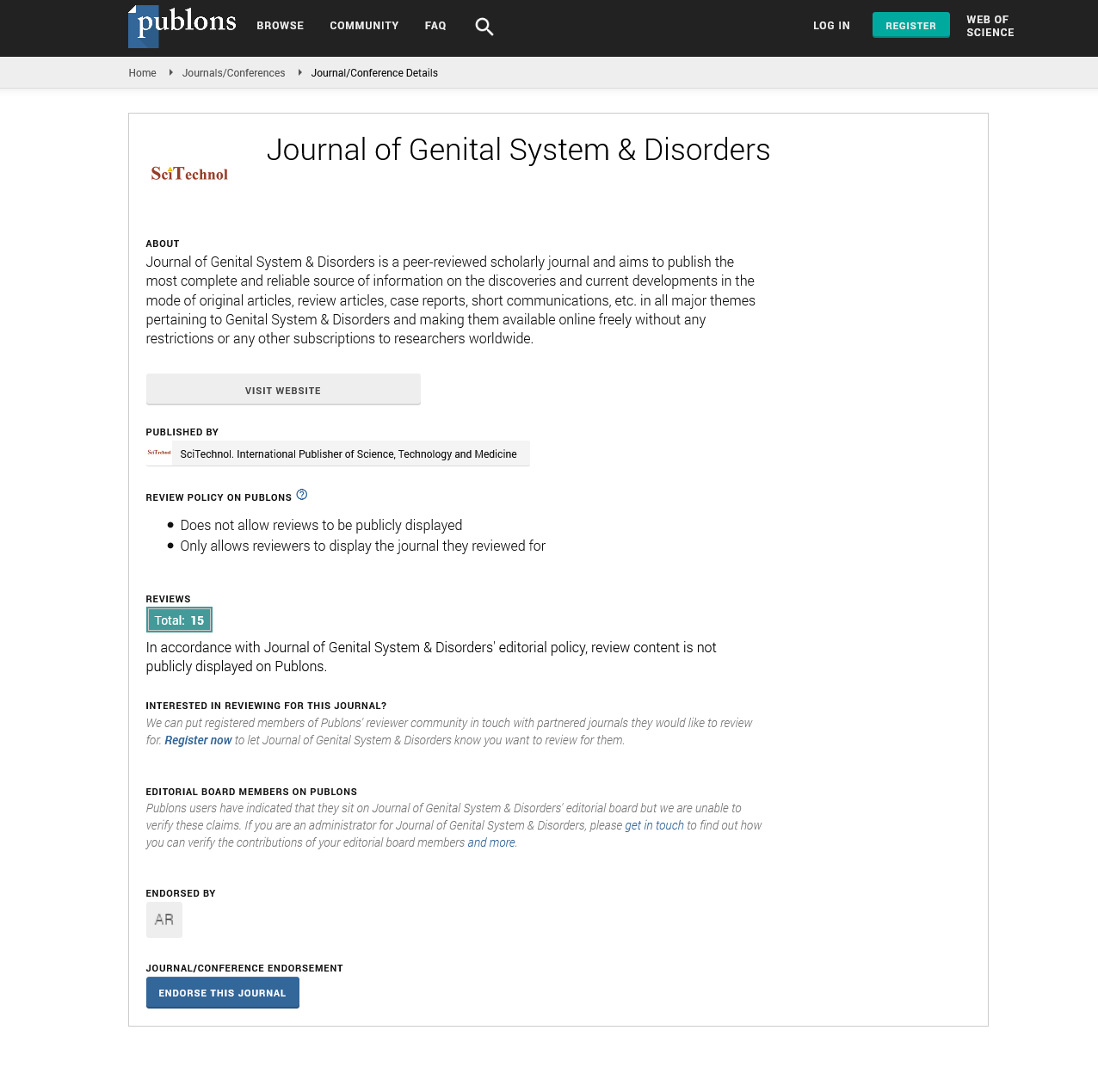Opinion Article, J Genit Syst Disord Vol: 12 Issue: 1
Polycystic Ovary Syndrome: Understanding the Causes, Symptoms, and Treatment Options
Frederick Guerrieri*
Department of Gynecology and Obstetrics, University of Pisa, Pisa, Italy
*Corresponding Author: Frederick Guerrieri
Frederick Guerrieri, Department of Gynecology and
Obstetrics, University of Pisa, Pisa, Italy,
E-mail: guerrierifrederick@gmail.com
Received date: 22 February, 2023, Manuscript No. JGSD-23-93536;
Editor assigned date: 24 February, 2023, Pre QC No. JGSD-23-93536 (PQ);
Reviewed date: 10 March, 2023, QC No. JGSD-23-93536;
Revised date: 17 March, 2023, Manuscript No. JGSD-23-93536 (R);
Published date: 24 March, 2023, DOI: 10.4172/ 2325-9728.1000267
Citation: Karlan M (2023) Polycystic Ovary Syndrome: Understanding the Causes, Symptoms, and Treatment Options. J Genit Syst Disord 12:1.
Description
Polycystic Ovary Syndrome (PCOS) is a common hormonal disorder that affects women of reproductive age. It is a complex condition that involves various symptoms, such as irregular menstrual cycles, excessive hair growth, acne, and weight gain. PCOS is also linked to other health problems, such as diabetes and infertility. In this manuscript, we will discuss the causes, symptoms, and treatment options for PCOS.
Causes of PCOS
The exact cause of PCOS is still unknown, but it is believed to be a combination of genetic and environmental factors. Women with PCOS have higher levels of androgens, the male hormones that are also produced in females. This hormonal imbalance can cause a disruption in the normal functioning of the ovaries, leading to the development of small cysts. Other factors that can contribute to the development of PCOS include insulin resistance, inflammation, and obesity.
Symptoms of PCOS
The symptoms of PCOS can vary from woman to woman and can range from mild to severe. Some of the most common symptoms of PCOS include:
• Women with PCOS may have infrequent or prolonged menstrual cycles, or may even stop menstruating altogether.
• PCOS can cause excessive hair growth on the face, chest, back, and other parts of the body.
• Women with PCOS may experience persistent acne on their face, chest, and back.
• PCOS can cause unexplained weight gain, especially around the waist.
• PCOS is a leading cause of infertility in women.
• Other symptoms: Other symptoms of PCOS may include fatigue, mood swings, sleep disturbances, and headaches.
Diagnosis of PCOS
Diagnosing PCOS can be challenging, as there is no single test to confirm the condition. Doctors will typically perform a physical exam, review the patient's medical history, and conduct various tests, such as blood tests and ultrasound imaging. The diagnostic criteria for PCOS include the presence of at least two of the following:
• Irregular menstrual cycles
• Excessive androgen levels
• Polycystic ovaries on ultrasound
Treatment Options for PCOS
• While there is no cure for PCOS, there are several treatment options that can help manage the symptoms and improve overall health. Some of the most common treatment options for PCOS include:
• Making changes to your diet and exercise habits can help manage weight and improve insulin sensitivity, which can help regulate menstrual cycles and reduce androgen levels.
• There are several medications that can help manage the symptoms of PCOS, such as birth control pills, metformin, and anti-androgen medications.
• Women with PCOS who are trying to conceive may benefit from fertility treatments, such as ovulation induction or In Vitro Fertilization (IVF).
• In rare cases, surgery may be recommended to remove cysts or to correct other structural issues in the reproductive system.
PCOS is a common hormonal disorder that affects millions of women worldwide. While there is no cure for PCOS, there are several treatment options that can help manage the symptoms and improve overall health. If anyone are experiencing any of the symptoms of PCOS, it is important to talk to doctor about concerns and to discuss the best treatment options. With proper management and care, women with PCOS can lead healthy, happy lives.
 Spanish
Spanish  Chinese
Chinese  Russian
Russian  German
German  French
French  Japanese
Japanese  Portuguese
Portuguese  Hindi
Hindi 
